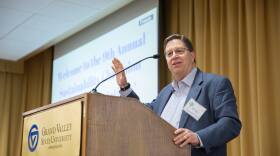In an effort to promote renewable energy alternatives to business owners, the Grand Rapids City Commission passed a resolution at the City Commissioners meeting Tuesday evening, establishing the Property Assessed Clean Energy Program in the city. The city says they felt “the time was right” to approve the establishment of PACE programs after a number of business owners expressed interest.
PACE, an acronym for Property Assessed Clean Energy is a program that offers property owners long-term loans to implement alternative energy sources like solar panels on their buildings without accruing any upfront cost. The long term loans come with fixed interest rates that owners can then repay through their property tax bills. As monthly energy costs reduce, the program creates an immediate cash flow for the business owner.
In addition, the City says bringing the PACE program to Grand Rapids supports the goals of District 2030.
“The Grand Rapids 2030 District we have a goal of reducing carbon by 50 percent from energy, water and transportation, by the year of 2030,” Cheri Holman, the Executive Director of the U.S. Green Building Council and Director of the 2030 District in Grand Rapids said.
“I think a lot of people feel that it’s a little bit, ‘too good to be true,’ but you know with the financing available for fifteen to twenty years, it generates immediate positive cash flow, so a building owner can implement carbon free utility sources and they are saving just much as money as they are spending in payment, and so positive cash flow from day one.”
While pace programs must be approved by local governments, the idea may be picking up steam. 21 other cities in Michigan have adopted PACE enabling legislation. And according to the United States Energy Department, 30 states and approximately $450 million in projects have been financed through PACE.





